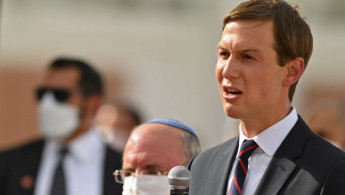Trump son-in-law Jared Kushner says Israel should ethnically cleanse Gaza and touts enclave's 'very valuable' waterfront properties
Jared Kushner, a senior advisor on Middle Eastern issues to former US President Donald Trump, has called on Israel to bulldoze parts of Gaza and expel Gaza's population to the Negev Desert, while touting the coastal enclave's lucrative "waterfront property" potential.
Kushner, who is also Trump's son-in-law, envisioned Gaza's population being forced out to the Negev or Egypt's Sinai to allow Israel to "clean up" the enclave.
"I’m sitting in Miami Beach right now and I’m looking at the situation and I’m thinking: what would I do if I was there?"
"Gaza’s waterfront property could be very valuable… if people would focus on building up livelihoods," he said, suggesting money to besieged Gaza had been spent on weapons and tunnels.
Kushner then suggested the temporary transfer of the enclave's population would in fact be permanent, admitting he couldn't imagine Israel allowing the Palestinians to return to their homes in Gaza.
He did admit he wasn't sure "there is much left of Gaza at this point", after four months of intense aerial and artillery bombardments by Israel.
"It's a little bit of an unfortunate situation there, but from Israel’s perspective I would do my best to move the people out and then clean it up," Kushner told Harvard, according to The Guardian.
"But I don’t think that Israel has stated that they don’t want the people to move back there afterwards.
"I do think right now opening up the Negev, creating a secure area there, moving the civilians out, and then going in and finishing the job would be the right move," he added later.
Kushner suggested Israel should pursue "diplomacy" to depopulate Gaza, with Egypt a possible home for the population, but failing that they could be transferred to Israel's Negev, he said, in a series of shocking statements about the war which has killed over 32,000 Palestinians.
"I would just bulldoze something in the Negev, I would try to move people in there. I think that’s a better option, so you can go in and finish the job," he said.
"I do think right now opening up the Negev, creating a secure area there, moving the civilians out, and then going in and finishing the job would be the right move."
Kushner was a key MENA policymaker in Trump's government but with almost no experience in government or specialisation in the Middle East, his appointment was considered by some as an act of nepotism.
He famously defended the plan - ironically known as the 'Deal of the Century' - by claiming to have read 25 books on the Middle East conflict.
His touted Israel-Palestine peace plan was immediately rejected by Palestinians, who said it would create ungovernable Bantustans, and widely ridiculed across much of the world.
The Abraham Accords model, which he helped shape, was more successful with the UAE, Bahrain, Sudan, and Morocco all agreeing to normalise ties with Israel.
His comments have been interpreted as a glimpse of what Middle East foreign policy might look like if Donald Trump wins this year's presidential elections.
In the Harvard talk, Kushner rejected Palestinian statehood, saying doing so would be a "superbad idea" and would be "essentially rewarding an act of terror".
The Kushner family has close personal and business ties to Israel including when Jared served as a government advisor, although he insisted this never interfered with his work.
After his time in government, Kushner launched a group devoted to promoting Arab ties with Israel and was reportedly keen on a Saudi normalisation deal.




 Follow the Middle East's top stories in English at The New Arab on Google News
Follow the Middle East's top stories in English at The New Arab on Google News

![A group of Palestinians, foreign and Israeli activists gather to participated in an olive picking event on the land in the town of Battir, which is under threat of confiscation by Israel in Bethlehem, occupied West Bank on 8 November 2024. [Getty]](/sites/default/files/styles/image_330x185/public/2182930803.jpeg?h=199d8c1f&itok=__0LgGsa)
